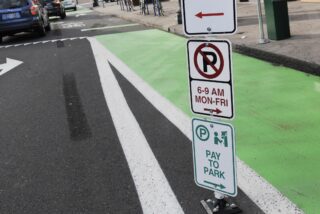“Helping people think there are some climate and equity impacts of their decision to drive downtown and park downtown.”
— Shoshana Cohen, PBOT
The City of Portland Bureau of Transportation is in dire financial straits. With a budget that was repeatedly cut before Covid ravaged revenues (which are largely dependent on car parking fees and fuel purchases), there’s not much meat left on the bone. At the bureau’s Budget Advisory Committee meeting Thursday night PBOT staff painted a bleak picture and asked for feedback on where to focus planned cutbacks. Staff also shared some near-term steps to raise revenue that could mean fewer cuts are necessary.
Among those “high level” near-term revenue ideas are three approaches that would increase the price of driving in Portland. In addition to raising meter rates and citation fine amounts, a new idea is on the table: The city is calling it a “climate and equity impact surcharge”. It would be a “small increase” in parking fees, “To begin capturing externalized costs related to driving into the central city.”
PBOT Business Services Group Manager Jeramy Patton said the bureau currently faces a $26 million deficit over the next five years, which would require $4.8 million in annual reductions to balance the budget. “Not to be doom-and-gloom” he added at last night’s meeting, “But our sixth year is looking at about a $22 million deficit just within that particular year alone.” And there’s no help currently on the horizon. “If you look at our our curve, it continues to expand the difference between kind of the revenues that we’re bringing in, and the expenses that are going out the door,” Patton explained.
We’ve known for years how PBOT is over-reliant on auto parking revenue, which puts them in direct conflict of their goal of having fewer people drive cars. The slides below from the November PBOT Budget Advisory Committee help tell that story:
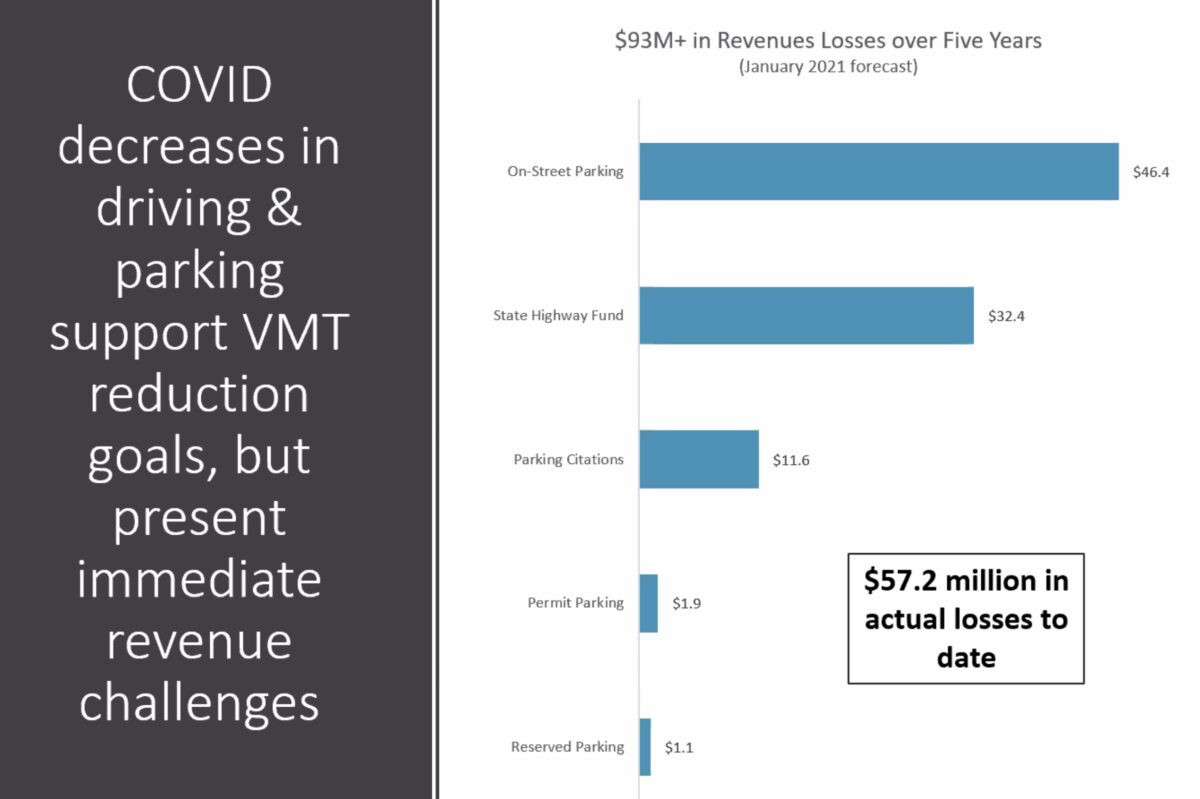
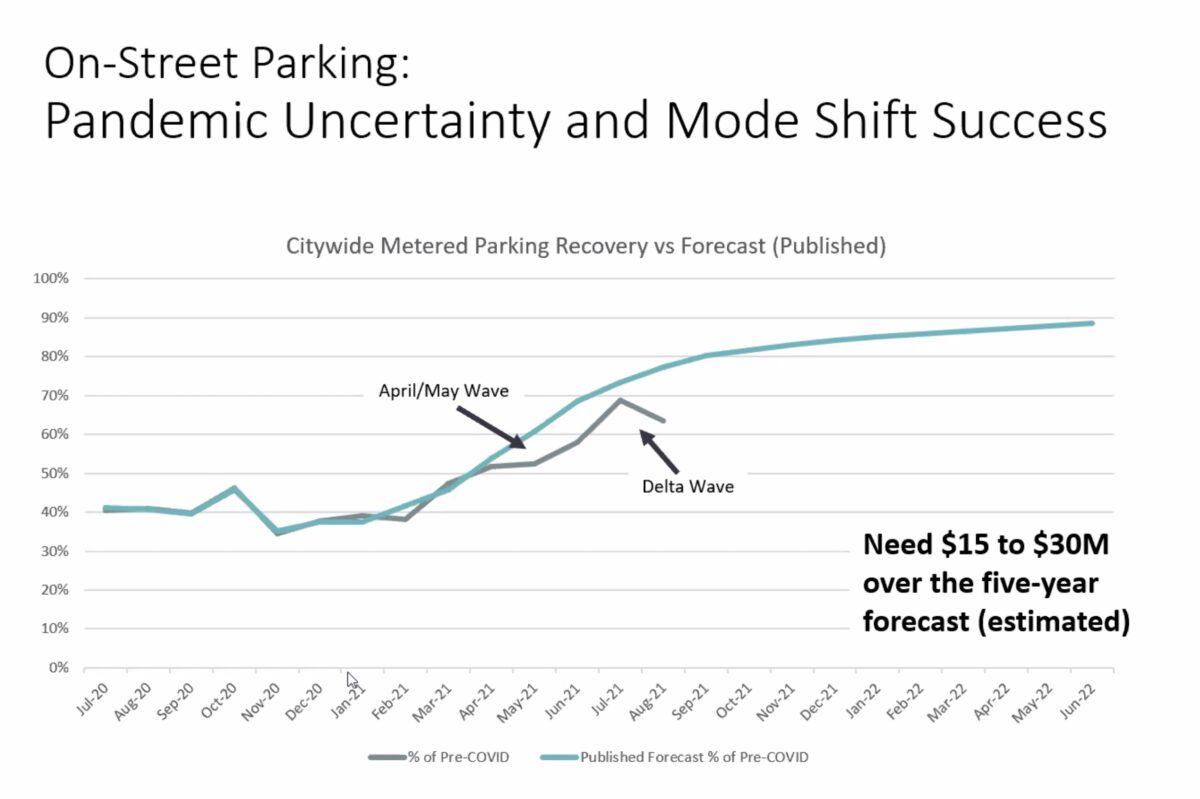
As you can see, massive changes in the central city and significant workplace shifts due to Covid, means revenue has plummeted and remains just 60% of where it was before the pandemic. Shoshanah Cohen, who manages the Pricing Options for Equitable Mobility (POEM) program for PBOT, said the agency was already down $57 million off projections leading up to Spring 2020. “There are no easy things left to cut,” she said, before asking the committee for feedback. “We’re already finding it harder to advance our Strategic Plan goals. It’s harder to make the system safer, more equitable, more climate friendly, improve mobility and maintain our assets…. We are working hard and trying to deliver for all of you, but the reality is $57 million, you know, matters.”
Advertisement
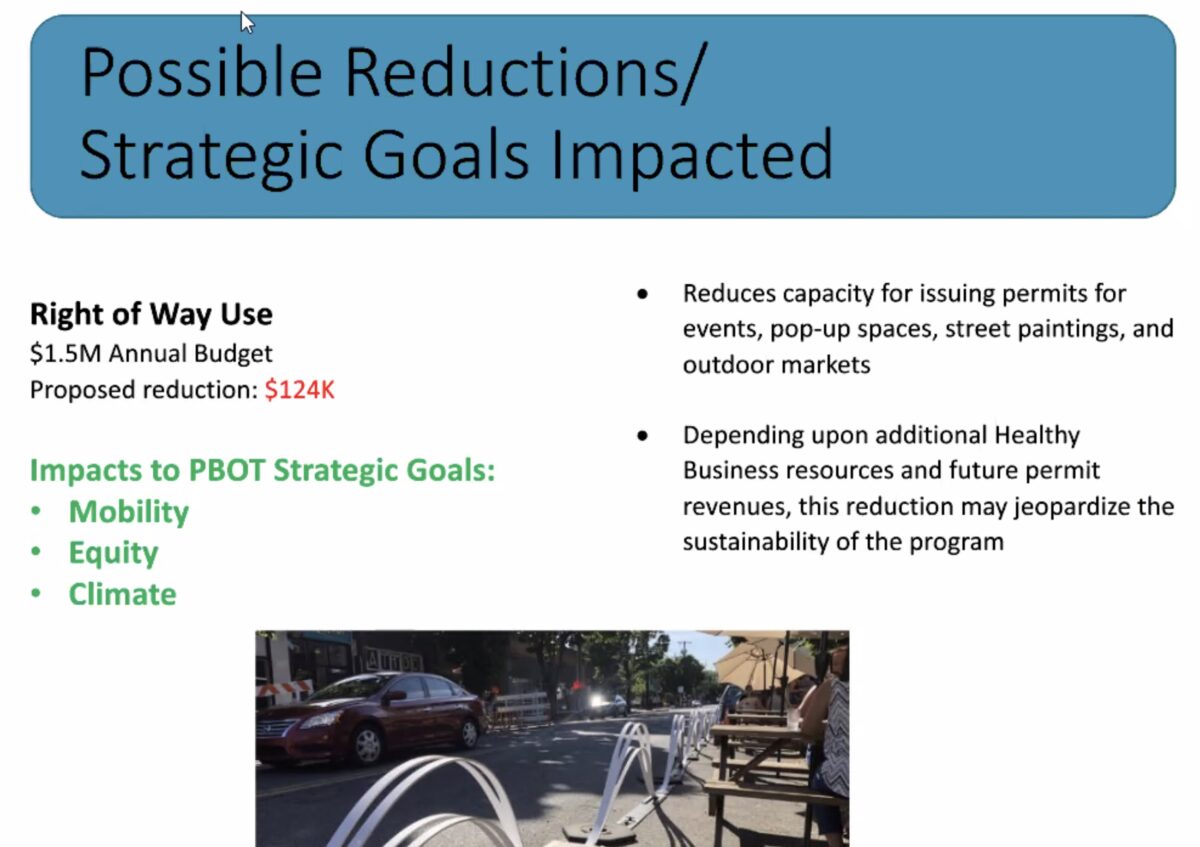
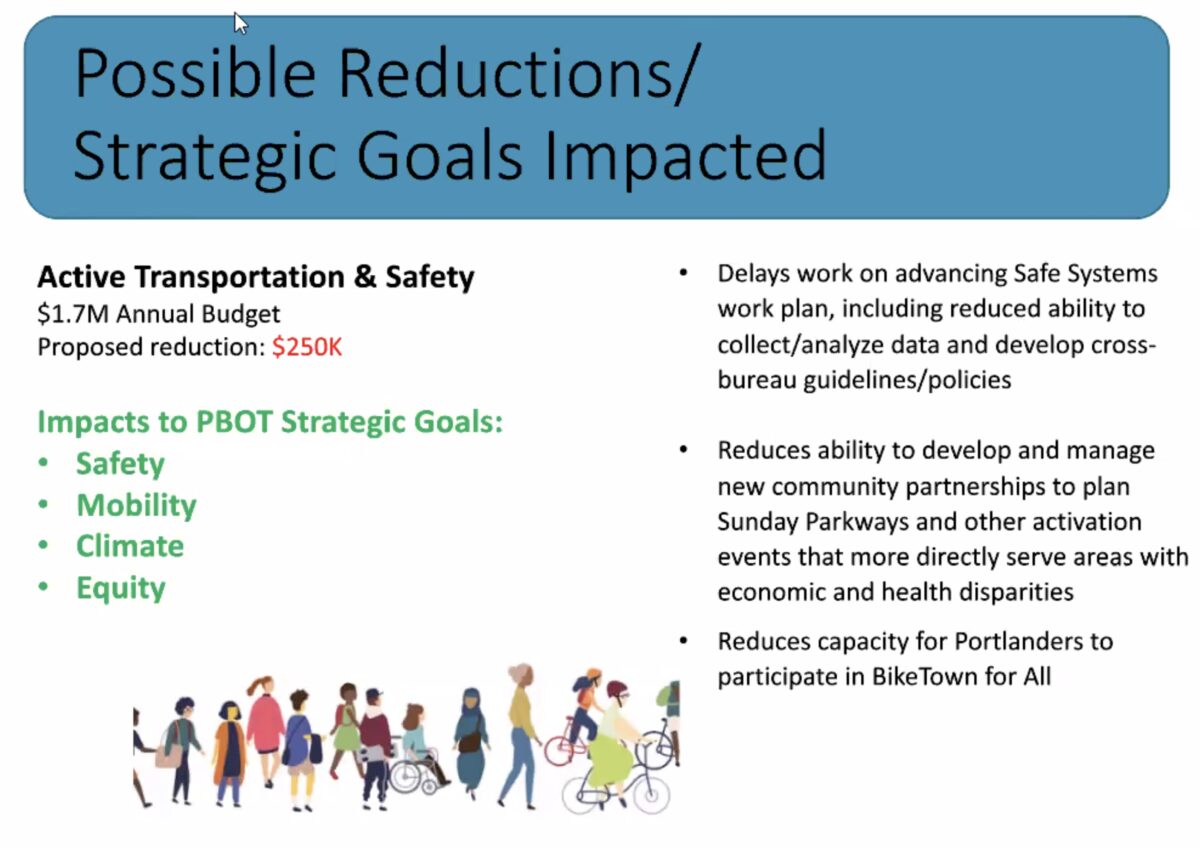
Patton then laid out cuts (in bold) under consideration in seven different program categories:
Active Transportation & Safety – $250,000 (total annual budget $1.7 million): This cut would delay PBOT’s work on a “Safe Systems” plan, would reduce ability to manage partnerships around Sunday Parkways and other street activation events, and would lead to reductions for the Biketown For All program.
Sidewalks Bridges & Structures – $560,000 (total annual budget $6.3 million): This cut would reduce maintenance on bridges and other structures, as well as increase time it takes to repair major equipment.
On Street Parking & Parking Enforcement – $976,000 (total annual budget $9.5 million): This cut would lead to cutbacks in customer service, reduce parking enforcement capacity, delay implementation of new parking plans, and reduce capacity for potential changes due to implementation of POEM recommendations.
Streets & Signs – $1.4 million (total annual budget $33.5 million): Would reduce microsurfacing treatments; lower their ability to upkeep pavement markings for lanes, crosswalks, and bikeways; and increase response times for signage replacements.
Right of Way Use – $124,000 (total annual budget $1.5 million): Reduces capacity for issuing permits for pop-up spaces, events, street paintings, and so on; could jeopardize Healthy Business plaza/patio program (unless PBOT starts charging businesses a fee for those permits).
Transportation Systems – $525,000 (total annual budget $3.1 million): Would reduce engineering capacity to develop a more equitable 823-SAFE outreach system; reduces number of safety enhancements made to transportation system.
Support Services – $780,000 (total annual budget $17.5 million): This cut would reduce PBOT’s capacity to support technology and communications-related services, as well as safety trainings, equity programs, and more.
With this grim task ahead of them, PBOT staff wanted the committee to give feedback on three questions: “Should the bureau raise revenue in the near-term in order to minimize further reductions?”, “What factors are most important as we consider potential reductions?”, and “How can we communicate with the public about transportation challenges and impacts?”
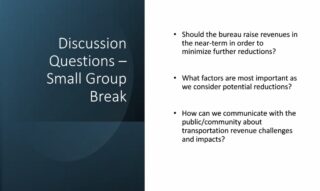
Advertisement

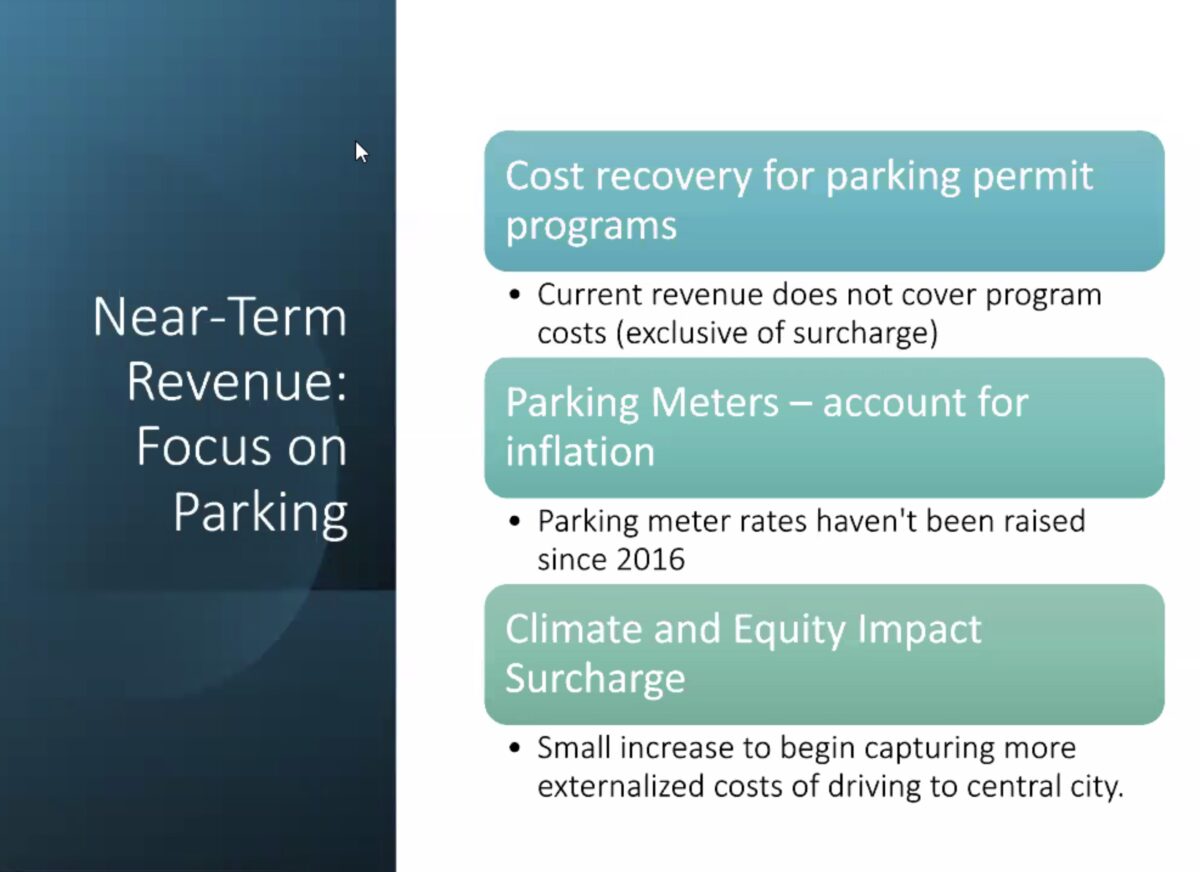
To that first question, nearly everyone on the committee (and at the meeting for that matter) was in support of the bureau doing more to raise revenue in the near term. Given PBOT’s financial picture, and the fact that they’ve already gone through the POEM process (which was unanimously supported by city council in October) and have come up with a list of recommendations on how to move forward, the city seems close to releasing a proposal for increased parking fees.
Cohen laid out three near-term revenue options that all relate to auto parking: Cost recovery for parking permit programs, (raise the price of permits to cover the cost to administer the program, which it doesn’t do now); raise meter rates to adjust for inflation (rate has been the same since 2016); and add a “climate and equity impact” surcharge. That last one is the most interesting. Cohen talked about it like it would be just as much of a marketing and behavior-change move as a revenue tool. It would be about, “Helping people think that there are some climate and equity impacts of their decision to drive downtown and park downtown,” she explained. “Sort of like naming that a little bit more clearly, and capturing some increased revenue that can help to support those program areas as well.”
A surcharge that helps educate people about the true cost of driving could also set the stage for larger revenue plans and fees on the horizon. Like congestion pricing, more dynamic meter rates, another gas tax increase, and so on. PBOT has longer-term plans to decouple their revenue sources from fossil fuels so they can get away from this “weird position” (as Cohen put it) of having to encourage driving in order to increase revenue.
As for feedback from the committee, there was very strong support for PBOT to come up with near-term revenue ideas to lessen the blow of impending cuts.
“On raising revenue, this is a good time to do that,” said Matthew Grumm, a PBOT government affairs manager, while reporting back from a breakout group. “In the sense that people know that things have changed and we can use that as an opportunity to say ‘Hey, we know that things are costing more’. People are aware of that. So it won’t be a shock if we say we have to raise some of these rates.”
CORRECTION, 2:50 pm: The story initially referred to Shoshana Cohen as Shoshana Oppenheim. The latter works for a different bureau at the city and I got them mixed up. I regret the mistake and apologize for any confusion. – Jonathan

